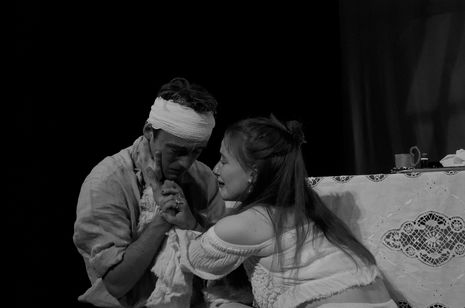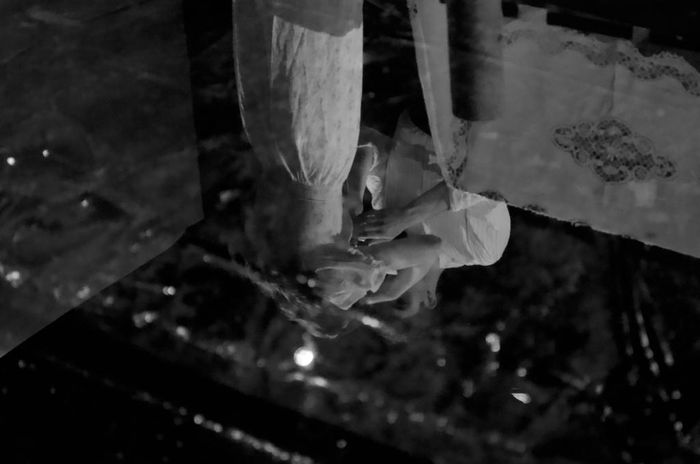Humanity drives The Seagull in this excellent rendition of the classic
Moments of brilliance capture the pains of life, love and ambition and serve as a powerful message to those letting life pass them by

Throughout The Seagull, Trigorin (Jacob Benhayoun) and Konstantin (Ollie Flowers), two writers at different stages in their careers, make reference to the author Turgenev, whose masterpiece Fathers and Sons pierced Russian society, something they both crave to do. Despite the men’s rivalry in writing and in love, it is the relationship between Arkadina and Konstantin, mother and son, that stole the show.
The play’s dramatic high point, encapsulating all that makes it successful, comes in Act III. As mother bandages her wounded son, the two find a moment of genuine connection amidst their otherwise strained relationship. Their relationship is under immense stress for Arkadina can’t seem to do anything other than belittle Konstantin’s creative endeavours. Her barbs are only made sharper by her new lover, a popular writer whom Konstantin despises. But in a respite from their constant battle, Arkadina cares for her son with a soft touch, the only tenderness she shows throughout the play.
“We get a glimpse into a fundamental tension of the human condition”
Eirlys Lovell-Jones is phenomenal. Her intensely human performance masterfully portrays the deep paradoxes that Arkadina attempts to make sense of. Arkadina is an actress with no conception of a personal identity separate from her characters. A woman possessing a deep despair and fear about her life, about who she would be if all the glamour of her performances were stripped away. But she masks this fear with a veneer of confidence, dismissal and egoism, never confronting her true feelings. As she clutches her sons head, damaged from his attempted suicide, there is a break in her persona. Visible only to the audience is a glimpse of terror on her face, that terror of life that can engulf us all, even as she tells her son that he must keep his head up and carry on. It is a moment that bridges the divide between mother and son and between generations. We get a glimpse into a fundamental tension of the human condition.
Across the cast, emotion is mined for its full richness. Flowers’ Konstantin starts off strongly, embodying the epitome of a tortured creative; ridiculed for his experimental forms yet possessing a fiery passion to break the theatre’s status quo. His most engaging acting comes from interactions with his mother, exploring their relationship and the role art has to play in it given their different conceptions of what makes art powerful. However his romance, with Emma Dawes’ Nina falters. Though they portrayed the joy of a young couple well, the sudden shift to their fractious stage felt unbelievable (as did Konstantin’s desperation and anguish as Nina rejects him) largely due to Flowers’ restrained performance.
“The ensemble all provided deep insight into their characters regardless of their stage time”
The despair of unrequited love was delicately handled by Masha (Irisa Kwok), confiding her love of Konstantin to Dorn (Liam Macmillan) in the most visually striking scene of the night. Bathed in a fractured yet piercing golden glow, the two own the moment through their stillness and willingness to let their emotions, not plot, take centre stage. This brilliantly executed relationship, between two supporting roles, was reflective of the ensemble as a whole, all of whom provided deep insight into their characters regardless of their stage time.
Contrasting the intensity of youth, Isaac Jackson as Sorin delivered a comedic yet quietly thoughtful performance. Jackson gave insight into a man afraid to die, afraid that he hadn’t made the most of his life but paralysed by the notion of taking control. Favouring calm conversation over grand gestures, he subtly captured the quiet sadness of an old man otherwise dismissed as rambling.
The director, Mimi Pattinson tackled this meta-theatrical script commendably. The often futile nature of artistic plaudits, and perhaps the whole artistic endeavour as a whole, was conveyed masterfully. The character work described in the show’s preview shone through and made for distinctive portrayals of characters that were written 130 years ago — this was best seen in Trigorin.
Whilst Trigorin has achieved literary fame, he is dissatisfied with his work, and never shows the alleged genius that everyone associates him with. This bold choice makes Trigorin’s literary skill subjective, only appreciated by Russian society and not something immediately obvious to the audience, making us question the way we evaluate art. When describing his creative process as inescapable and draining, Benhayoun eyes conveyed a certain pleading — showing how consuming he found writing. As a result, all his relationships are secondary. Benhayoun mastered the portrayal of a weak, unsure man, persuaded to do things he doesn’t really care about due to his ultimate resignation to anything but his writing. By not portraying him as obviously brilliant, Pattinson asks: “what really is the difference between Trigorin and Konstantin?” It seems only to be the reception they receive - both are consumed by writing and struggle to live up to the artistic ideals they arbitrarily place on themselves.
Ultimately, the triumph of the production was how brilliantly the sense of unfulfillment was conveyed and just how human the pain felt. Everyone is reaching desperately for the thing that would make them happy. The majority of characters never get what they reach for. And the one who did, Nina, found out that placing your happiness in the hands of others is a dangerous game. The Seagull is a play that inspires life, for you walk away determined not to end up like the characters you have just seen. It is a powerful call to grab life with both hands and not let go.
The Seagull plays at the ADC Theatre from Tuesday 16th to Saturday 20th May, 7:30pm
 News / SU reluctantly registers controversial women’s soc18 December 2025
News / SU reluctantly registers controversial women’s soc18 December 2025 Features / Should I stay or should I go? Cambridge students and alumni reflect on how their memories stay with them15 December 2025
Features / Should I stay or should I go? Cambridge students and alumni reflect on how their memories stay with them15 December 2025 News / Dons warn PM about Vet School closure16 December 2025
News / Dons warn PM about Vet School closure16 December 2025 News / Cambridge study finds students learn better with notes than AI13 December 2025
News / Cambridge study finds students learn better with notes than AI13 December 2025 News / Uni registers controversial new women’s society28 November 2025
News / Uni registers controversial new women’s society28 November 2025










